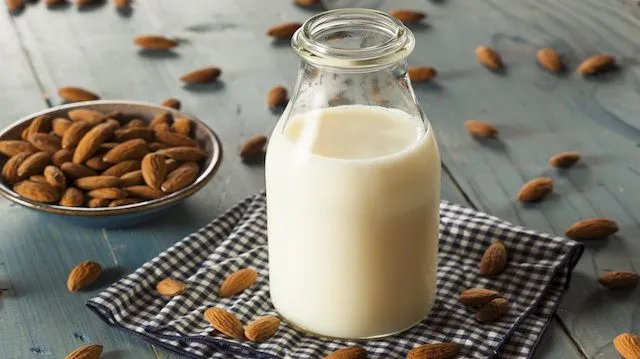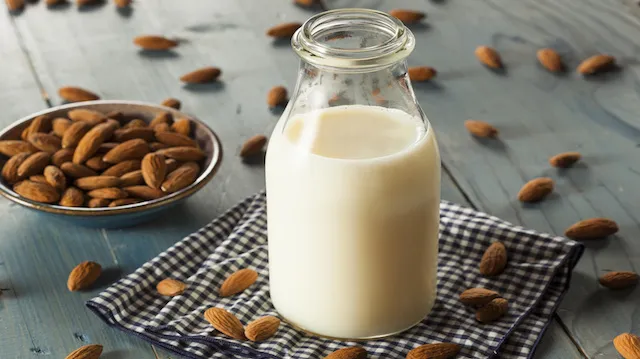
- Share on Facebook84
- Share on Pinterest
- Share on Twitter
There has been a rise in non-dairy milk sales within the last decade. However, many of these non-dairy milks come with a large price tag, additives, and excess sugar. Why not just make your own at home with some items already in your kitchen?
While regular organic milk has a number of health benefits, some people choose not to drink it for a variety of reasons. Vegans, individuals with food sensitivities, and others who simply prefer non-dairy milks have long been exploring alternative milk options — and there are many great ones to choose from.
Non-dairy milks can contain a wealth of nutrients if they are made from real-food ingredients. Many non-dairy milks on the market, made with plant-based ingredients such as nuts and seeds, are organic and of a high quality. However, others are not as healthy.
Some commercial non-dairy milks sold in stores contain additives like gums, refined oils, and fillers for stabilization purposes. Many also contain a controversial additive known to potentially disrupt gut function: carrageenan. Carrageenan is a type of seaweed which, when incorrectly processed, may lead to gut inflammation and even IBS-related symptoms.
While there are high-quality organic options out there, they can often be pricey. So, why not make your favorite non-dairy milks at home?
All you need is a high-speed blender, some clean, filtered water, and the ingredients of your choice.
The following are 10 ingredients you can easily make into great non-dairy milks:
Almonds
Almonds are the most popular base of non-dairy milks today. They’re a great source of magnesium, calcium, and potassium, along with healthy fats. To make your own, use 1 cup of almonds with 3 cups of filtered water and 1 teaspoon of a natural sweetener such as raw honey, coconut sap, or pure maple syrup. You can also use a couple of drops of pure vanilla extract, if you wish.
To make the milk: Soak some almonds overnight, drain in the morning, and blend the soaked almonds with the water and sweetener for 2 full minutes. Strain the milk through a nut milk bag or cheesecloth over a large bowl, squeezing the milk out little by little. You can save the pulp left in the bag to bake muffins or grain-free pancakes.
The milk will last for 3 days in the fridge and can be kept in mason jars for easy storage.
Sunflower seeds
Sunflower seeds are a great option if you’re allergic to nuts. You’ll want to use 1 cup of sunflower seeds to 3 cups of water. Follow the same directions for almond milk, since these seeds need to be soaked and drained as well. The soaking process helps soften them up and enhances the taste.
Sunflower seeds are a great source of magnesium, protein, and vitamin E. This milk stores well and lasts for around 3–4 days.
Peanuts
Like peanut butter? You can make your own peanut milk! Try to buy organic peanuts, or if you can, raw jungle peanuts, which are free of the toxins that may be present in some types of peanuts sold in the United States. You do not need to soak peanuts, simply blend 1 cup with 3 cups of water and follow the directions to make milk described above.
Peanuts are a great source of B-vitamins, protein, iron, and zinc. Peanut milk will keep for 2–3 days in the fridge.
Gluten-free rolled oats
Oat milk is a true treasure if you’ve never had it! Though it is higher in carbohydrates than nut milks, it is especially soothing and wonderful for your mood and hair. Gluten-free rolled oats are the best way to make oat milk, since this milk will digest more easily and contains more benefits than processed forms of oats, which could be contaminated with wheat.
Rolled oats are high in magnesium, tryptophan, and B-vitamins which help calm the mood and decrease stress. Oat milk is also high in calcium, potassium, and iron. Soak 1 cup of oats overnight in water, drain in the morning, and blend with 3 cups of filtered water either alone or with a natural sweetener of your choice.
As a bonus, oat milk is great to wash your hair and skin with, since it’s rich in calming, anti-inflammatory properties. Oat milk will keep for 3–4 days in the fridge.
Pepitas (pumpkin seeds)
Pepitas are high in iron, zinc, folate, and protein, along with omega-3 fats and copper. They’re a fantastic seed to turn into milk, and they do not need to be soaked beforehand. Choose organic pumpkin seeds, preferably from the United States, since some cheap imported seeds may come from China where they’re prone to heavy metal exposure.
Pumpkin seed milk is a sweet, nutty milk that is a bit green in color, but still perfectly suitable for porridge, stews, and smoothies. Pumpkin seed milk will keep for around 3–4 days.
Cashews
Cashews make a particularly nice, creamy milk, and they are a great source of iron, magnesium, and zinc. Cashew milk is the best option to choose if you want a creamy, subtle milk that can be used in both savory and sweet recipes.
To make cashew milk, be sure to soak your cashews overnight, but feel free to skip the draining process in the morning. They do not need to be drained since their skins do not contain harsh enzymes that can inhibit nutrient absorption.
Blend 1 cup of cashews with 3 cups of filtered water (including the soaking water if you like). Sweeten as you prefer and store for 3–4 days.
Coconut milk
High in healthy fat and antibacterial properties, coconut milk is great for your immune and digestive systems, and can help regulate your mood due to its beneficial fatty acids. You can make coconut milk a few different ways, and no soaking is required.
Either blend ½ cup of raw coconut butter (pureed coconut flesh) with 3 cups of filtered water, or blend 1 cup of coconut shreds with 3 cups of filtered water. Strain the milk as normal, sweeten if you like and blend again. This milk will store for up to 5 days in the fridge since it has natural antibacterial properties that prevent bacteria formation.
Another option would be to use fresh coconut meat. Blend 1 cup of loosely-packed coconut meat with 3.5 cups of water, then follow the directions above. It will also keep for 5 days in the fridge.
Hemp seeds
Hemp seeds are a complete protein, so if you’re looking to pack on lean muscle and ensure you get enough protein, consider using these magical seeds to make milk with. Hemp seeds require no soaking and produce a deliciously nutty milk.
To make, blend 1 cup of hemp seeds with 3.5 cups of filtered water, add your sweetener, and strain and milk as normal with a nut milk bag. This will keep for 4 days in the fridge and can be used in porridge, savory dishes, and smoothies of all kinds.
Since hemp seeds are high in omega-3s and chlorophyll, this milk also makes a great anti-inflammatory skin wash if you’d like a natural beauty option to add moisture to your skin.
Flax seeds
You may have seen cartons of flax milk at your local health-food store. While these options are low in calories, to be honest, they’re not very flavorful. Flax seeds are also very prone to becoming rancid, therefore these milks, which have been heated, might not be the best option. Consuming rancid oils may lead to inflammation.
You can easily make your own cold-processed flax seed milk at home, and you do not need to soak your seeds before blending. Simply blend 1 cup of raw, cold flax seeds (brown or golden is fine) with 3 cups of filtered water, then strain and milk as normal.
Remember to always store your flax seed in a colored container in the fridge, since they turn rancid at room temperature and when exposed to air and light. You’ll want to store your flax milk in a colored pitcher, preferably one that is not plastic. A tinted mason jar pitcher or colored glass jar are great options.
Sweeten as you like and keep for up to 4 days in the fridge. Flax milk made at home is actually very tasty, with a sweeter nutty flavor compared to store-bought options. It’s also great for your hormones and contains anticancer properties.
Quinoa
Quinoa milks are also popping up in stores, and if you are short on time, these quinoa milks (as long as they are organic and do not contain additives) are a great choice and do taste nice. However, since this milk is hard to come by and quite pricey, why not consider making your own at home? It’s very simple to do!
Blend 1 cup of either white, red, or black quinoa with 3.5 cups of filtered water, a sweetener of your choice, and a pinch of finely-ground sea salt (it helps tone down the bitter flavors of quinoa). You do not need to soak quinoa before turning it into milk, but you will need to give it a good rinse since the skin contains bitter components known as saponins. Rinsing for a few minutes in a tea strainer is an easy way to take care of this!
Quinoa milk stores for 4–5 days in your fridge and goes nicely in sweet dishes like muffins, pancakes, oatmeal or quinoa porridge, and smoothies.
What about soy and rice?
 When it comes to soy milk, there is evidence that unfermented soy may be harmful to the body in several ways. So, even though it’s non-dairy, it may be best to skip this one, or at least to do your own research on the subject first, so that you can make an informed decision.
When it comes to soy milk, there is evidence that unfermented soy may be harmful to the body in several ways. So, even though it’s non-dairy, it may be best to skip this one, or at least to do your own research on the subject first, so that you can make an informed decision.
Though you can certainly make your own rice milk, because rice needs to be cooked first, it can be a bit more laborious. However, feel free to experiment with it if you like! Most rice milks require you to soak the rice overnight, then boil it, strain, cool, and blend 1 cup with 3.5 cups of filtered water.
You can make it plain, or sweeten it and use however you like.
Making your own non-dairy milks at home might seem like a challenge, but the benefits are so worth it! Less inflammation, better skin and digestion, and better hormone function are just some of the benefits you’ll likely experience. If you do choose store-bought options, be sure to choose those that are non-GMO and completely free of carrageenan, added sugars (look for unsweetened), and MSG.
Do you make your own non-dairy milks? If so, feel free to share your favorite recipe!
—Heather McClees
Heather McClees is a professional health journalist and Certified Holistic Nutritionist from South Carolina.She received her B.S. Degree in Nutrition Science and Dietetics, and is most passionate about helping others discover the gift of of holistic health, showing others how to create healthy recipes based on their favorite foods, physical fitness and yoga, and creative writing.
Sources:
http://www.dailymail.co.uk/femail/article-2790215/as-david-cameron-jumps-latest-food-fad-ditch-dairy.html
http://www.pcrm.org/health/cancer-resources/ask/ask-the-expert-dairy-products
- Share on Facebook84
- Share on Pinterest
- Share on Twitter

